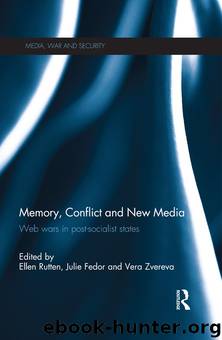Memory, Conflict and New Media by Ellen Rutten Julie Fedor & Vera Zvereva

Author:Ellen Rutten, Julie Fedor & Vera Zvereva
Language: eng
Format: epub
Publisher: Routledge
A survey: post-Soviet Wikipedia and memory wars
Note first that Wikipedia constitutes extremely rich source material for the researcher studying the post-Soviet memory wars. Through its very large dataset and its transparent structure, the site makes it possible to follow page history in detail – discussion (‘talk’) pages are archived – and to trace each conflict history and each editor’s contribution (through the ‘edit history’ pages). Through user profile pages, the site also provides a vast amount of information, more or less reliable, on its editors: place of birth, native language, country of residence, education level, political leanings, interests and hobbies, personal contribution to the project, awards granted by the Wikipedia community, etc. Frequently, one can also find less relevant information, including preferences about music, books, and even eating habits.
To judge from these profile pages, the post-Soviet users would appear to be characterized by especially high levels of performativity. Many of them do not hesitate to exhibit, through so-called userboxes, their strong identity rooting, along with ostentatious proclamations of their ideological commitments. A userbox is a small coloured box on a Wikipedian’s user page, which serves as a communicative notice about the user (Wikipedia: Userboxes). Conceived to help the collaboration on articles, userboxes can, however, be potentially divisive. Often they boast provocative content that is capable of generating significant tension among Wikipedia editors and of increasing the temperature of the debate. Currently, this userbox-mania is tending to decrease on Russian Wikipedia, being systematically repressed by administrators, but it is still thriving in the Ukrainian edition.7 Here are some examples of ‘political’ userboxes used by members of the Russian and particularly Ukrainian Wikipedia communities: This user identifies as a Communist; This user is against communism; This user identifies as a Ukrainian Nationalist; This user is a Russian patriot; This user supports the independence of Chechnya; This user opposes the independence of Kosovo, etc.
Within Wikipedia, the debates frequently focus on various controversial issues related to Ukraine, starting from simple disagreements over the spelling of geographical names, which may differ depending on the reference language, Russian or Ukrainian: Kiev/Kyiv, Kharkov/Kharkiv, na Ukraine/v Ukraine,8 etc. It is interesting to note that the case of Kiev/Kyiv (the capital of Ukraine) is also quoted within Wikipedia’s list of the lamest edit wars in the English edition (Wikipedia: Lamest edit wars).
Tensions can take the shape of ongoing drawn-out conflicts on a transnational scale (unofficially called holyvory in Russian Internet parlance, from the English ‘holy wars’); online ‘battles’ of various kinds (the Battle for the Ukrainian State Navy,9 the Battle for Khar’kov,10 the Mazepa Campaign11), and multiple foci of long-term warfare.
The military analogy that resounds in these terms is also embodied in the system of awarding Wiki Barnstars to the most active contributors. Our examples include the Ukrainian Barnstar (‘I give you this Ukraine Barnstar for improving the Russia–Ukraine gas disputes article’); the barnstar For Bravery (‘You are hereby awarded this Ukrainian National Award “For Bravery” in recognition of your contributions to Ukraine-related historical articles, insistence on credibly sourced
Download
This site does not store any files on its server. We only index and link to content provided by other sites. Please contact the content providers to delete copyright contents if any and email us, we'll remove relevant links or contents immediately.
| Arms Control | Diplomacy |
| Security | Trades & Tariffs |
| Treaties | African |
| Asian | Australian & Oceanian |
| Canadian | Caribbean & Latin American |
| European | Middle Eastern |
| Russian & Former Soviet Union |
The Secret History by Donna Tartt(16651)
The Social Justice Warrior Handbook by Lisa De Pasquale(11492)
Thirteen Reasons Why by Jay Asher(7797)
This Is How You Lose Her by Junot Diaz(5791)
Weapons of Math Destruction by Cathy O'Neil(5045)
Zero to One by Peter Thiel(4832)
The Myth of the Strong Leader by Archie Brown(4795)
Promise Me, Dad by Joe Biden(4453)
Beartown by Fredrik Backman(4429)
Stone's Rules by Roger Stone(4421)
How Democracies Die by Steven Levitsky & Daniel Ziblatt(4407)
The Fire Next Time by James Baldwin(4349)
100 Deadly Skills by Clint Emerson(4084)
A Higher Loyalty: Truth, Lies, and Leadership by James Comey(4038)
Rise and Kill First by Ronen Bergman(4017)
The David Icke Guide to the Global Conspiracy (and how to end it) by David Icke(3890)
The Farm by Tom Rob Smith(3878)
Secrecy World by Jake Bernstein(3787)
The Doomsday Machine by Daniel Ellsberg(3736)
